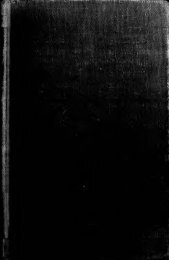Ecclesiastes - GA Barton - 1908.pdf
Ecclesiastes - GA Barton - 1908.pdf
Ecclesiastes - GA Barton - 1908.pdf
You also want an ePaper? Increase the reach of your titles
YUMPU automatically turns print PDFs into web optimized ePapers that Google loves.
1 62 ECCLESIASTES<br />
9 7 . Come<br />
eat thy bread with joy]. The sudden transition leads<br />
Siegfried to find the hand of another author here. That, however,<br />
seems unnecessary. Qoheleth, like other men, could come<br />
under the influence of various moods or various systems of thought.<br />
Each could possess him in turn without preventing the return of<br />
the other. Life has no outlook, its problems are insoluble, death<br />
will end all, but enjoy sensation and the sunshine while it lasts,<br />
this is his philosophy, cf,<br />
2 24 12 -<br />
3<br />
22<br />
5 18 8 15 . When a modern man<br />
realizes how many different conceptions and moods he can<br />
entertain, he finds fewer authors in a book like Qoheleth. Bread<br />
. . . and wine]. These are often taken as the means of subsistence<br />
or of hospitality, cf. Gn. i4 18<br />
2y 28 28 Dt. 33 i S.<br />
20 i6 25 18 6 Neh. 5<br />
La. 2 12 Tobit 4 15 - 17<br />
. Already God has accepted thy works]. The<br />
thought apparently is, God, by the constitution of the world, has<br />
left this as the only source of enjoyment, and this is evidence that<br />
such a course is acceptable to Him. As Hubert Grimme pointed<br />
out (Orient. Liter aturzeitung, VIII, col. 432^".), vvs. 7-9 are strik-<br />
ingly paralleled in a fragment of the Gilgamesh epic, published by<br />
Meissner in the Mitteilungen der vorderasiatischen Gesellscha/t,<br />
1902, Heft i. The passage (col. Ill, 3^".) reads:<br />
Since the gods created man,<br />
Death they ordained for man,<br />
Life in their hands they hold,<br />
Thou, O Gilgamesh, fill indeed thy belly,<br />
Day and night be thou joyful,<br />
Daily ordain gladness,<br />
Day and night rage and make merry.<br />
Let thy garments be bright,<br />
Thy head purify, wash with water;<br />
Desire thy children, which thy hand possesses,<br />
A wife enjoy in thy bosom,<br />
Peaceably thy work (?)....<br />
The argument here is so closely parallel to that of Qoheleth that<br />
one can scarcely doubt but that he was influenced by the passage.<br />
The Gilgamesh epic can have been influenced neither by Stoic<br />
nor Greek thought. This passage shows that the combination of<br />
pessimism and brightness which we find in Qoheleth, is thoroughly<br />
Semitic, and, to the Semitic mind, congruous. See further above,<br />
Introduction, 6 (2).





